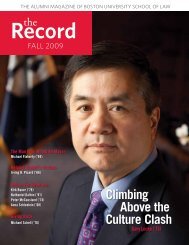the nature of representation: the cherokee right ... - Boston University
the nature of representation: the cherokee right ... - Boston University
the nature of representation: the cherokee right ... - Boston University
Create successful ePaper yourself
Turn your PDF publications into a flip-book with our unique Google optimized e-Paper software.
140 PUBLIC INTEREST LAW JOURNAL [Vol. 15<br />
fact that “in <strong>the</strong> Cherokee Nation, having a little Indian blood is a valuable<br />
commodity, <strong>the</strong> stuff <strong>of</strong> power that ensures a political identity, voting <strong>right</strong>s as a<br />
Cherokee citizen, and access to a variety <strong>of</strong> economic resources.” 254 But it is also<br />
an overstatement to suggest that, among Cherokees, <strong>the</strong> racial characteristics <strong>of</strong><br />
those who are defined as having a <strong>right</strong> to a delegate are unimportant since <strong>the</strong>y<br />
have <strong>the</strong> potential to cause disputes. 255<br />
2. Opposition from O<strong>the</strong>r Tribes<br />
The Cherokee nation will probably face opposition from many o<strong>the</strong>r Indian tribes<br />
if it attempts to seat its Congressional delegate. A delegate representing only <strong>the</strong><br />
Cherokees would likely seem unfair to o<strong>the</strong>r tribes who, like <strong>the</strong> Cherokees, were<br />
pushed from <strong>the</strong>ir homelands but were not afforded a delegate <strong>right</strong> in <strong>the</strong>ir removal<br />
treaties (if <strong>the</strong>y signed a treaty at all). Even for tribes never forced <strong>of</strong>f <strong>the</strong>ir<br />
homelands, a Cherokee delegate arguably threatens <strong>the</strong> interests <strong>of</strong> all non-Cherokee<br />
tribes. Such a delegate would be <strong>the</strong> de facto voice <strong>of</strong> <strong>the</strong> Indian community in<br />
Washington, D.C., and non-Cherokee tribes would <strong>right</strong>ly be concerned that such a<br />
delegate might favor <strong>the</strong> Cherokee Nation at <strong>the</strong> expense <strong>of</strong> non-Cherokee tribal<br />
nations.<br />
The Cherokee response to non-Cherokee tribal opposition must be tw<strong>of</strong>old.<br />
First, <strong>the</strong> Cherokee Nation must educate o<strong>the</strong>r tribes on <strong>the</strong> legal and historical<br />
reasons why <strong>the</strong> Cherokees have a unique delegate <strong>right</strong>. Second, <strong>the</strong> Cherokee<br />
Nation must be willing to consider non-Cherokee suggestions regarding <strong>the</strong><br />
Cherokee delegate. Non-Cherokees will likely highlight <strong>the</strong> Cherokee delegate’s<br />
de facto role as representative for all Indians to argue that <strong>the</strong> delegate should be a<br />
pan-Indian delegate ra<strong>the</strong>r than a Cherokee delegate. The Cherokee Nation’s<br />
seemingly unique <strong>right</strong>, under this view, reflects <strong>the</strong> shared trauma <strong>of</strong> Indian<br />
oppression and <strong>the</strong> efforts <strong>of</strong> many tribes to resist that oppression. 256<br />
The practical and political challenges <strong>of</strong> Indian approval <strong>of</strong> a Pan-Indian delegate<br />
are perhaps as daunting as <strong>the</strong> non-Cherokee tribal opposition to a solely Cherokee<br />
delegate. As holders <strong>of</strong> <strong>the</strong> delegate <strong>right</strong>, <strong>the</strong> Cherokees would probably object to<br />
such an arrangement based both upon principle, since it is <strong>the</strong>ir historical <strong>right</strong>, and<br />
upon <strong>the</strong> likely effect on <strong>the</strong> Cherokee Nation. In 1866, <strong>the</strong> Cherokee nation<br />
“strenuously objected” to a territorial Indian council with equal tribal<br />
254 STURM, supra note 20, at 105.<br />
255 See Eric Lemont, Overcoming <strong>the</strong> Politics <strong>of</strong> Reform: The Story <strong>of</strong> <strong>the</strong> Cherokee<br />
Nation <strong>of</strong> Oklahoma Constitutional Convention, 28 AM. INDIAN L. REV. 1, 25-28<br />
(2003/2004) (describing <strong>the</strong> recent debate on Cherokee blood quantum in <strong>the</strong> context <strong>of</strong><br />
<strong>the</strong> Cherokees’ recent efforts to form a new Constitution).<br />
256 Resistance is <strong>the</strong> crucial trait, for it was U.S. desire that <strong>the</strong> Cherokees accept <strong>the</strong><br />
“liberal” treaty terms that led to New Echota’s Article 7, but perhaps <strong>the</strong> U.S. would<br />
not have been so “liberal” had <strong>the</strong> U.S. government been able to fully focus on <strong>the</strong><br />
Cherokee Nation instead <strong>of</strong> being partly tied down by having to deal with o<strong>the</strong>r tribes.









